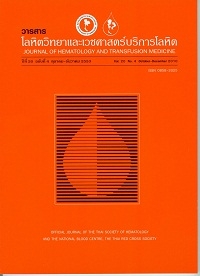Anti-I as a Cause of Autoimmune Hemolytic Anemia
คำสำคัญ:
Anti-I, Autoimmune hemolytic anemiaบทคัดย่อ
บทคัดย่อ
Anti-I ส่วนใหญ่เป็นแอนติบอดีที่ไม่สำคัญเพราะทำปฏิกิริยาที่อุณหภูมิต่ำโดยมีไตเตอร์น้อยกว่า 64 ที่อุณหภูมิ 4๐C น้อยรายที่จะทำให้มีการทำลายเม็ดเลือดแดง วัตถุประสงค์ : เพื่อรายงานโรค autoimmune hemolytic anemia (AIHA) ที่มีสาเหตุจาก anti-I จำนวน 1 ราย ผู้ป่วยชายไทย อายุ 61 ปี ซีด Hb8.8g/dLHct 26% MCV92fLMCH 31.1 pgMCHC33.8%สเมียร์เลือด เม็ดเลือดแดงมี autoagglutination การตรวจหมู่เลือด ABO ด้วยวิธี standardtube test แปลผลไม่ได้ การตรวจ direct antiglobulin test ที่อุณหภูมิ 37๐Cพบ C3dเกาะอยู่บนเม็ดเลือดแดง autocontrol ให้ผลบวก การตรวจแยกชนิดแอนติบอดีเป็น anti-I ไตเตอร์ anti-I ที่อุณหภูมิ 4๐Cอุณหภูมิห้องและที่อุณหภูมิ 37๐Cมีดังนี้คือ 65536, 512และ 4 ตามลำดับ การทดสอบซีรัมผู้ป่วยด้วย dithiothreitol พบว่า anti-I เป็น IgMการทำgentle heat elution ที่อุณหภูมิ 45๐Cและนำเม็ดเลือดแดงที่ elute แล้วมาตรวจ cell groupingด้วยวิธี gel test เป็นหมู่ AB heat elution ที่อุณหภูมิ 56๐Celuate ให้ผลลบ การทำcoldautoadsorption นำadsorbedserum มาตรวจ serum groupingพบว่าเป็นหมู่ AB การทำmilk inhibition test น้ำนมสามารถทำปฏิกิริยายับยั้ง anti-I ในซีรัม เม็ดเลือดแดงผู้ป่วยมีการแตกทำลาย ปริมาณ LDH สูง haptoglobin ต่ำindirect bilirubin สูงเล็กน้อย ปริมาณ IgMสูง ระดับ C4 ต่ำสรุป : พบผู้ป่วย AIHA ที่มี autoanti-I (coldtype) ในไตเตอร์ที่สูงมาก ทำให้การตรวจหมู่เลือด ABO แปลผลไม่ได้ ดังนั้นทางห้องปฏิบัติการควรทำgentle heat elution และ coldautoadsorption เพื่อให้ทราบหมู่เลือดที่ถูกต้อง การตรวจหาชนิดของแอนติบอดีและการตรวจไตเตอร์ของ anti-I มีประโยชน์ต่อการวินิจฉัยและการวางแผนการรักษาผู้ป่วยต่อไป
Key Words : Anti-I, Autoimmune hemolytic anemia
Abstract
Anti-I is a common antibody present in the serum of normal healthy individuals. It reacts best at 4oC with a titer less than 64 and is usually not associated with in-vivo red cell destruction. Objective : To report an interesting case of autoimmune hemolytic anemia (AIHA) due to anti-I. A 61-year-old man was presented with anemia. The hemoglobin was 8.8 g/dL and hematocrit was 26%. The MCV was 92 fL, MCH was 31.1 pg and MCHC was 33.8%. Peripheral blood smear showed significant autoagglutination and red cells clumping under magnification. Direct antiglobulin test at 37๐C revealed C3d coated red cells. Autocontrol was positive. Anti-I was found in his serum with titers of 65536, 512 and 4 at the temperature of 4oC, room temperature and 37oC, respectively. Dithiothreitol treated serum demonstrated that anti-I was IgM. Gentle heat elution at 45oC was done and the eluted red cells was AB. Heat elution at 56oC was performed and the eluate was non reactive. Cold autoadsorption was performed. The adsorbed serum was tested for serum grouping, resulting that he was AB. Milk inhibition test showed that anti-I in serum was inhibited by human milk. Indirect bilirubin was mildly elevated and lactate dehydrogenase was increased reflecting red cell destruction. Serum haptoglobin and C4 level were decreased. The IgM was increased. Conclusion : A case of cold-type autoanti-I AIHA was detected. The autoanti-I effected in ABO phenotyping. Gentle heat elution and cold autoadsorption were performed to solve the problem. The high titer of autoanti-I specificity was identified to facilitate the appropriate treatment.
Key Words : Anti-I, Autoimmune hemolytic anemia



